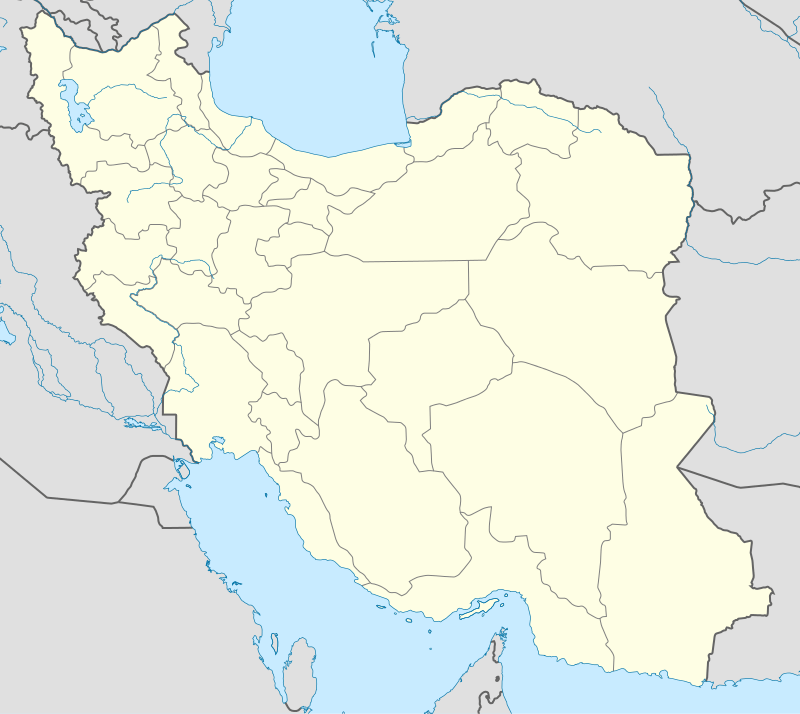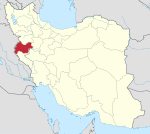Paveh
| Paveh Pāwe | |
|---|---|
| City | |
 Paveh | |
| Coordinates: 35°02′36″N 46°21′23″E / 35.04333°N 46.35639°ECoordinates: 35°02′36″N 46°21′23″E / 35.04333°N 46.35639°E | |
| Country |
|
| Province | Kermanshah |
| County | Paveh |
| Bakhsh | Central |
| Elevation | 1,560 m (5,120 ft) |
| Population (2016 Census) | |
| • Total | 25,771 [1] |
| Time zone | UTC+3:30 (IRST) |
| • Summer (DST) | UTC+4:30 (IRDT) |
| Area code(s) | +(98)83 |
Paveh (Kurdish: Pawe, Persian: Pāwe, also Romanized as Pāveh, Pawah, and Pāweh)[2] is a city and capital of Paveh County, Kermanshah Province, Iran.
The spoken language in the city is Kurdish, but the language which is used in schools and offices is Persian, as the official language of Iran in which almost everyone in the city is fluent.
History
An old myth regarding the name of the city is that the Emperor Yazdgerd III sent his son named Pav to this area to renew his religious Zoroastrian faith. Both Persians and the local Kurdish inhabitants practiced Zoroastrianism during the Persian Empire's Sasanian era from which this myth is derived.
Geography
Location, topography
Paveh is located in the west of Iran and is 112 km far from Kermanshah and lies in a sub-region along the Iran-Iraq border commonly referred to as Hewraman situated within the larger geographical region of Kurdistan. The city is considered by inhabitants of the region as the capital of the Hewraman.
Climate
As a mountainous city, Paveh has cold winters and cool springs. The surrounding mountains are normally filled with fresh spring water from March to June. The town is also encircled with large fruit gardens which create a beautiful scenery during summers. Paveh is situated along a mountainside like most cities and villages in the Hewraman region. Behind the city is Shaho mountain and ahead of the city is a view of Atashgah, another mountain that was once the site of pilgrimages for ancient religions in the region. Among the most significant places to visit is the Quri Qaleh cave which is considered as the longest watery cave in the Middle East. The cave is located around 25 Kilometers from Paveh's city center.
Demographics
At the 2011 census, its population was 23,704, in 6,723 families.[3] The inhabitants of Paveh are mostly Kurds that speak Auramani (also:Hewrami.
Landmarks
Rivers
Sirwan River is one of the biggest rivers in Paweh. It rises near Sanandaj, in the Zagros Mountains of Iran. It then descends through the mountains, where for some 32 km it forms the border between the two countries. It finally feeds into the Tigris below Baghdad. Navigation of the upper reaches of the Diyala is not possible because of its narrow defiles, but the river's valley provides an important trade route between Iran and Iraq.
Mountains
Paweh is established among mountains on Zagros Mountains. The mountain chain of Shaho is located in the west of Paweh. Shaho is the highest mountain in Kermanshah with the elevation of 3390.[4]
Notable people
Gallery
.jpg) Paweh
Paweh
References
- ↑ https://www.amar.org.ir/english
- ↑ Paveh can be found at GEOnet Names Server, at this link, by opening the Advanced Search box, entering "-3078102" in the "Unique Feature Id" form, and clicking on "Search Database".
- ↑ "Kermanshah Census". http://www.amar.org.ir/Default.aspx?tabid=1603. Statistical Centre of Iran. Retrieved 4 February 2015. External link in
|website=(help) - ↑ "Shaho Mountain". http://www.mountain-forecast.com/peaks/Shaho. Retrieved 4 February 2015. External link in
|website=(help)
